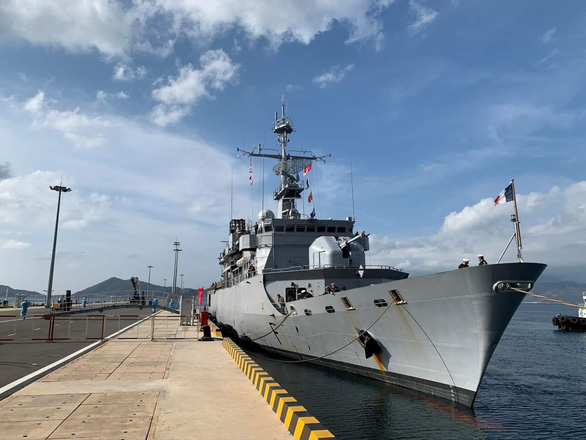A stronger presence of Europe could put pressure from the international community on China over the East Vietnam Sea issue.
Amid reports that Germany would deploy warships through the East Vietnam Sea for the first time in 19 years, China on March 3 called on Berlin not to infringe on the sovereignty of the claimants in these waters.
The Chinese Ministry of Foreign Affairs’ spokesperson Wang Wenbin asserted that all have freedom of navigation and overflight in the East Vietnam Sea, but “this should not be used as an excuse to endanger sovereignty and security of coastal countries.”
International law is the common interest
The above statement shows a familiar move of China when it claims sovereignty over most of the East Vietnam Sea, and warns countries not to “interfere” in how Beijing deals with Southeast Asian countries.
However, the move of Germany, Canada, and other European countries to announce the deployment of warships to the waterway this year signals their growing engagement in regional security.
Dr. Le Hong Hiep from the Institute for Southeast Asian Studies (ISEAS - Yusof Ishak Institute, Singapore) analyzed that Europe’s greater involvement in the East Vietnam Sea issue, both diplomatically and militarily, is helping with the ‘internationalization’ of the maritime dispute, making it not only a problem between China and other direct claimants, but also an international security issue, where outside countries, including European states, all have interests.
In a statement in December 2020, Ambassador of the European Union (EU) to China Nicolas Chapuis reaffirmed: “Freedom of navigation is essential. The [East Vietnam Sea] is not only a Chinese problem, but an international issue.”
Since late last year, U.S. allies in Europe have openly rejected China’s sovereignty claim through a series of diplomatic notes sent to the United Nations.
According to Carl Thayer, emeritus professor at the University of New South Wales, Ambassador Chapuis was only stating the obvious since the present and future security and prosperity of European states are inextricably bound up with the stability and prosperity in the Indo-Pacific region in general and Southeast Asia in particular.
“This region is the engine of world economic growth,” Prof. Thayer remarked.
“Traditional freedom of navigation and navigation for lawful commercial activities and military transit make a vital component of the rules-based order globally and regionally.
“In sum, China’s assertion of illegal claims to the [East Vietnam Sea] is the cause of internationalization because it negatively impacts the vital national interests of so many maritime states.”
Long-term commitment needed
In addition to its maritime interests, Europe has many other economic and political motivations for maintaining a presence in the waterway.
Prof. Thayer noted that by 2020, the Association of Southeast Asian Nations (ASEAN) had replaced China as the European Union’s largest market.
Meanwhile, Dr. Hiep said that besides the ‘QUAD’ of the Pacific (comprising the United States, Japan, Australia, and India), analysts are referring more to the ‘QUAD’ of the Atlantic (including the United States, the United Kingdom, France, and Germany).
“The common denominator of both groups is the United States, while the main target of both is China,” he told Tuoi Tre News.
“Therefore, on a broader view, the increase in the involvement of European countries in the [East Vietnam Sea] and the increasing internationalization of the maritime dispute indicate increasingly fierce strategic competition between the United States and China.”
In other words, Europe’s deeper involvement in the East Vietnam Sea is a plausible tendency when it finds shared interests in its policy, Washington’s, and its partners’ in Southeast Asia.
However, while Europe’s recent military moves have been rampant, suggesting a ‘one-and-all’ and systematic response, there are also some concerns about the levels of its commitment to this region.
Dr. Sascha-Dominik Dov Bachmann, a professor at Canberra Law School, University of Canberra (Australia), said that the recent developments are noteworthy but should not necessarily be seen as part of a coordinated pushback on China’s ambitions.
“Most of these states have been subject to China’s wolf-warrior diplomacy in recent months and it could be argued that the deployment of naval assets takes place to send a signal to both Beijing and the audience at home that China’s current assertiveness has consequences,” Bachmann told Tuoi Tre News.
“I don’t see these naval operations as being something more than an ad hoc measure for the time being – with the exception of the U.S. and the UK.”
Likewise, Singapore scholar Collin Koh Swee Lean believes that only the United States, the United Kingdom, and perhaps Canada, which are the countries with ‘one-and-all’ actions, share the same goal.
“I don’t think they actually act in unison, and I see more competitive dynamic than anything else – recall that even amongst European powers, there’re also rivalries amongst them.
“We might say that there’s some unity in purpose or efforts between the U.S. and UK, and perhaps Canada.
“The Europeans want to stand out as different from the U.S. in particular.”
Like us on Facebook or follow us on Twitter to get the latest news about Vietnam!



















































